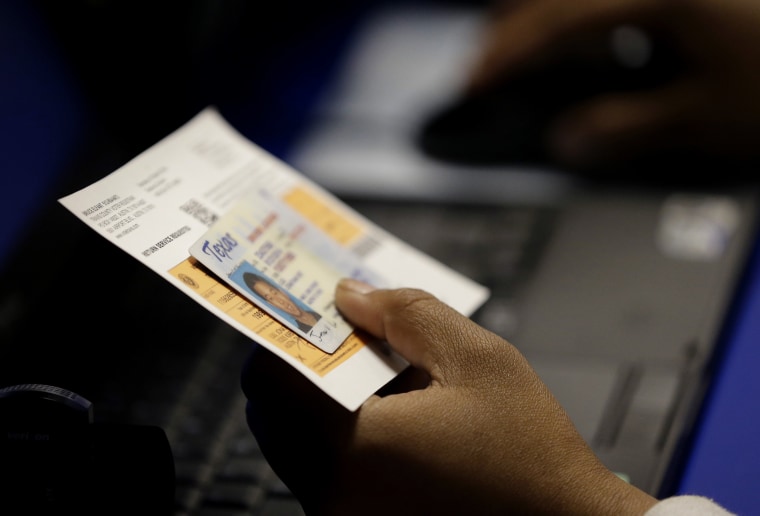Before President Trump reiterated debunked claims of widespread voter fraud and vowed to investigate earlier this week, his administration had already quietly signaled that it is likely to view strict voting laws far more favorably than his predecessor.
Just hours after Trump was sworn in as president last Friday, Justice Department lawyers challenging Texas’ voter ID law asked a federal appeals court to delay a hearing in the case. The hearing had been scheduled to consider whether the law intended to discriminate against racial minorities, or whether it merely did so incidentally.
“The United States requires additional time to brief the new leadership of the department on this case and the issues to be addressed at that hearing before making any representations to the court,” the Justice Department lawyers wrote.
The Texas law was passed in 2011 after a concerted campaign to generate concern over illegal voting much like the one that Trump has launched. In 2006, Greg Abbott — then the state’s attorney general, today its governor — announced a $1.5 million effort to root out voter fraud, which Abbott called “an epidemic” that was happening “on a large scale.” Lawyers for the state were later able to produce just two cases of in-person voter impersonation — the only kind of fraud that might be stopped by the ID law — out of millions of votes cast.
The Justice Department’s request for a delay in the case drew far less attention than Trump’s subsequent remarks on voter fraud.
Trump's false claim this week that millions of “illegals” voted in last year’s presidential election and his plan for a national voter fraud probe have been roundly condemned, even by some Republicans. Numerous studies have shown beyond doubt that systemic voter fraud of any kind, let alone on the massive scale Trump has alleged, simply doesn’t exist. But the new president’s focus on the bogus issue could nevertheless lay the groundwork for efforts to impose restrictions on voting that hamper access to the ballot.
The Justice Department's move last week has sparked concern among opponents of the Texas law that the new administration intends to back out of the case or change its position.
If that happened, the challenge could still continue, since it’s also being brought by civil rights groups. But it would be a serious blow to the effort to overturn the law, because Justice Department lawyers have played a major role in the case, and the government can often provide manpower that advocacy groups often lack. It also would send a message to other states mulling restrictive voting laws that they can likely move ahead without risking push-back from Washington.
“The Justice Department has poured tremendous resources into this case,” said Kristen Clarke, the executive director of the Lawyers Committee for Civil Rights Under Law. The request for a delay, said Clarke, “raises questions about the direction they are taking under new leadership.”
Adding to those fears is the likely makeup of Trump’s Justice Department. Sen. Jeff Sessions, who, if confirmed, will serve as attorney general, led a controversial voter fraud investigation as Alabama’s attorney general in the 1980s. The probe came up empty, and civil rights groups say it had a chilling effect on black voter participation.
Sessions also has been accused of making racist comments — an issue that derailed his 1986 confirmation to be a federal judge. (Sessions has said he's not prejudiced.) And the new acting head of the Justice Department’s Civil Rights Division, Thomas Wheeler, an Indiana lawyer with ties to Vice President Mike Pence, offered advice to Texas lawmakers on how to draft the ID measure.
The Texas law requires voters to show one of several forms of photo ID issued by the state or federal government. A handgun license is deemed acceptable, but not a student ID, even from a state-run university. An estimated 600,000 registered Texas voters, disproportionately black and Hispanic, lack the required ID. One study found that the law may have been responsible for swinging Texas’s only competitive congressional district to the GOP in 2014.
Three different federal courts have blocked or overturned the law under the Voting Rights Act, with one judge holding the law to be an unconstitutional poll tax—a finding that was later overturned. Still, a modified version of the measure remained in effect for the 2016 election, while the legal wrangling continues.
Trump is expected to sign an executive order focused on voter fraud in the coming days, White House press secretary Sean Spicer said. In remarks at a retreat for congressional Republicans on Thursday, Trump said: "We are going to protect the integrity of the ballot box, and we are going to defend the votes of the American citizens, so important."
